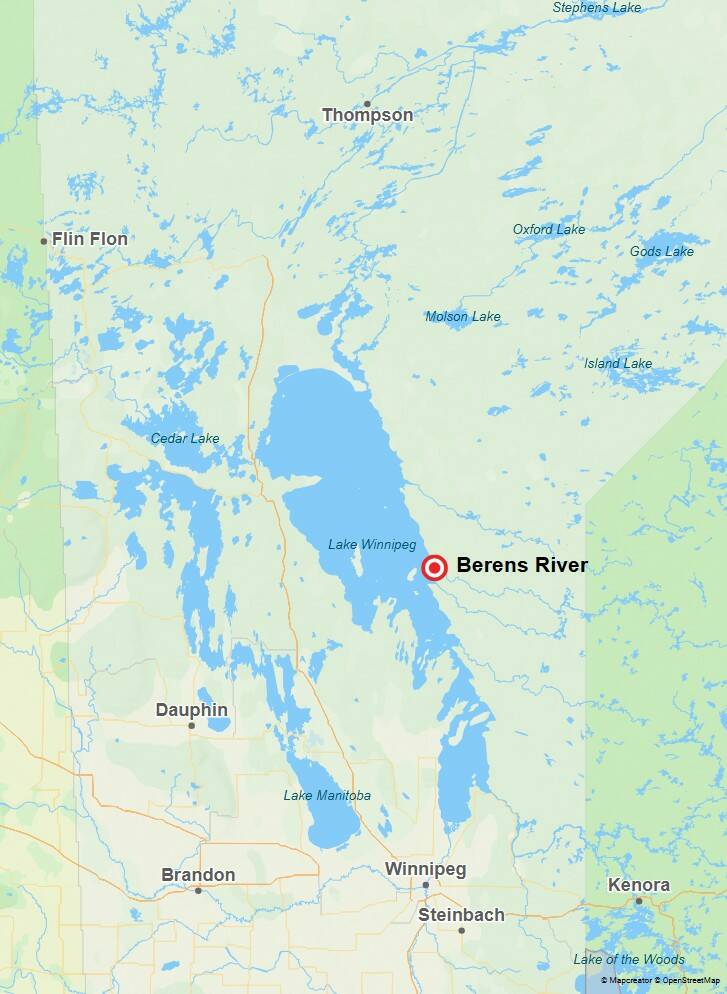Berens River sues Hydro over Lake Winnipeg project
Advertisement
Read this article for free:
or
Already have an account? Log in here »
To continue reading, please subscribe:
Monthly Digital Subscription
$0 for the first 4 weeks*
- Enjoy unlimited reading on winnipegfreepress.com
- Read the E-Edition, our digital replica newspaper
- Access News Break, our award-winning app
- Play interactive puzzles
*No charge for 4 weeks then price increases to the regular rate of $19.00 plus GST every four weeks. Offer available to new and qualified returning subscribers only. Cancel any time.
Monthly Digital Subscription
$4.75/week*
- Enjoy unlimited reading on winnipegfreepress.com
- Read the E-Edition, our digital replica newspaper
- Access News Break, our award-winning app
- Play interactive puzzles
*Billed as $19 plus GST every four weeks. Cancel any time.
To continue reading, please subscribe:
Add Free Press access to your Brandon Sun subscription for only an additional
$1 for the first 4 weeks*
*Your next subscription payment will increase by $1.00 and you will be charged $16.99 plus GST for four weeks. After four weeks, your payment will increase to $23.99 plus GST every four weeks.
Read unlimited articles for free today:
or
Already have an account? Log in here »
Berens River First Nation is suing Manitoba Hydro and the provincial and federal governments over a nearly 50-year-old hydroelectric project it alleges has devastated the Lake Winnipeg environment and fishery.
The First Nation, about 275 kilometres northeast of Winnipeg on the eastern shore of the lake, filed the statement of claim in the Court of King’s Bench this week over the public utility’s Lake Winnipeg regulation project, which began in 1976.
The project manipulates water levels on Lake Winnipeg for power generation. It includes the Jenpeg generating station and diversion channels that increase the outflow of water from the lake into the Nelson River.

“Manitoba Hydro’s operation of the LWR project has significantly altered the lands and waters of Lake Winnipeg and has had devastating impacts on BRFN’s treaty rights and reserve lands,” the court papers say.
It alleges the project has worsened water quality, flooded land, eroded shoreline and affected traditional harvesting, hunting and trapping areas. Flooding has affected housing, the claim said.
The lawsuit says fish and fish habitat have been affected, with spawning grounds damaged.
It goes on to say low water levels during the spring and summer fishing seasons expose rocks, mud and sand bars, creating hazards for fishers, and affecting where fish are located in the water.
The fish have moved further from the shore, in search of deeper, colder water, which has disrupted the community’s ability to pass down knowledge of prime fishing locations to youth, the court papers say.
The project has also affected habitat for animals, such as beavers and muskrats, and traditionally gathered plants, including wild rice, have become scarce.
The First Nation seeks an environmental assessment of the project and a say in decisions that affect the lake.
The court filing claims no environmental assessment was conducted, nor have any comprehensive studies or examinations been completed into the effects of the project on the lake, environment or treaty rights.
The allegations haven’t been heard in court and the public utility and governments have yet to file statements of defence.
The province granted Hydro an interim licence to operate the project in 1970. The public utility applied for a final licence in 2010, leading the Clean Environment Commission to hold public hearings, in 2011, about the project’s effects on the lake.
The province granted a final licence in 2021, which expires in August 2026.
The Berens River court filing claims the environment commission’s final report, issued in 2015, relied on self-reported data from Hydro and no independent assessment or technical studies were completed.
Berens River participated in the 2011 licensing hearing and consultations, but claims it didn’t “receive adequate capacity support,” which hurt its ability to participate, the court papers say.
The First Nation wants monetary damages for the cost to remediate reserve land, including for claimed damage to structures, docks and homes; and damages related to the community’s alleged hampered ability to exercise its rights under Treaty 5.
The claim seeks a court-ordered injunction barring Hydro from operating the regulation project in a way that causes nuisance or trespass to the reserve land. It wants “appropriate and sufficient” technology installed to monitor the effects of the project.
erik.pindera@freepress.mb.ca

Erik Pindera is a reporter for the Free Press, mostly focusing on crime and justice. The born-and-bred Winnipegger attended Red River College Polytechnic, wrote for the community newspaper in Kenora, Ont. and reported on television and radio in Winnipeg before joining the Free Press in 2020. Read more about Erik.
Every piece of reporting Erik produces is reviewed by an editing team before it is posted online or published in print — part of the Free Press‘s tradition, since 1872, of producing reliable independent journalism. Read more about Free Press’s history and mandate, and learn how our newsroom operates.
Our newsroom depends on a growing audience of readers to power our journalism. If you are not a paid reader, please consider becoming a subscriber.
Our newsroom depends on its audience of readers to power our journalism. Thank you for your support.

